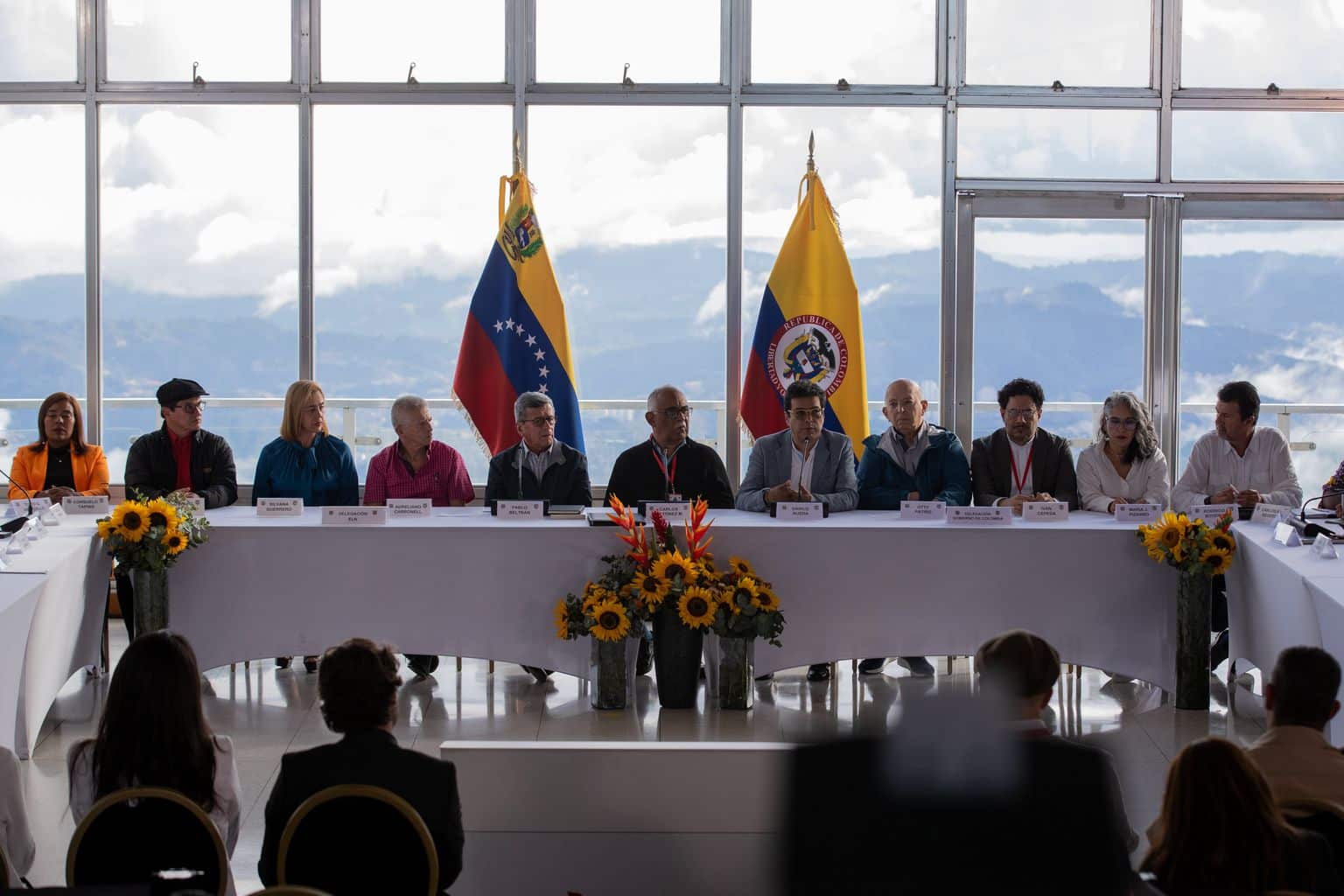
All the delegates participating in the peace talks between the ELN and the Colombian government in Caracas on Monday, November 21, 2022. Photo: EFE.

Orinoco Tribune – News and opinion pieces about Venezuela and beyond
From Venezuela and made by Venezuelan Chavistas

All the delegates participating in the peace talks between the ELN and the Colombian government in Caracas on Monday, November 21, 2022. Photo: EFE.
The government of Colombia and the National Liberation Army (ELN) reactivated peace talks in Caracas on Monday, November 21, to seek a peaceful solution to the conflict in Colombia. The resumption of negotiations seeks to advance on the issues that had been disccussed during the government of former President Juan Manuel Santos, aiming to establish a “total peace” by during the administration of recently elected President Gustavo Petro.
The meetings in Caracas are being held by representatives from both parties and from the governments of Cuba, Venezuela, and Norway, in addition to other guests.
Below are a few of the most significant statements issued by the main delegates following the first day of negotiations:
• Pablo Beltrán, head of the ELN peace delegation team, said that the great international support increased the sense of responsibility among participants.
• Beltrán expressed his belief that the moment of change for Colombia has finally arrived. This has been expressed in multiple ways, including the 2020 national strike and the election of Petro. “We assume responsibility,” said Beltrán, “hoping that these talks become part of that wave of change, and we expect not to fail in that expectation.”
• The commitment must be from everyone. “In this sense,” said Beltran, “we present ourselves here with an ideal: Colombians cannot see each other as enemies. The work we must carry out is for reconciliation, to rediscover common ground, and to build a nation in peace and equity.”
• “Today we are honoring life,” said Danilo Ruedo, high commissioner for peace and representative of Colombia’s government, “the lives of so many who are no longer here because violence has taken them away.” Ruedo made reference to those murdered, disappeared and kidnapped in the context of the armed and social conflict in Colombia. At least 500,000 Colombians have been killed in an internal conflict that has raged since the assassination of progressive politician and presidential candidate Jorge Eliécer Gaitán on April 9, 1948, which triggered the Bogotazo.
The events of 1948 were followed by brutal government repression of communists and socialists, and spawned the seemingly endless internecine conflict between Colombia’s armed forces, government-aligned right-wing paramilitaries, and largely left-wing guerrilla organizations including the ELN. The war has also involved international actors, particularly the United States, which maintains a military occupation of the country through troops stationed on at least seven military bases.
Colombia’s Government and ELN Sign Agreement in Caracas to Resume Peace Talks
• “We are representing those lives to try to resolve a series of conflicts,” said Ruedo. Regarding respect for differences, he welcomed “the recognition of the origins from which we come and have participated in,” while pointing out the need to overcome the inequalities imposed by the Colombian oligarchy.
For the high commissioner, the dialogue “is giving certainties and the deep conviction that we are going to achieve the purpose that unites us: to be sons and daughters of the same country, with changes and transformations.”
It is necessary to “build a nation where we all fit, [where] we can live in dignity, [and where] we can express ourselves freely,” said Ruedo. “This government of dialogue goes through respect for life that is expressed in thought … to begin to build consensus on the project of the nation and the country… We are in a historic and almost unique moment for the country.”
• “34 years ago, Carlos Pizarro signed a call for peace with all Colombians with the government of that time,” said Otty Patiño, head of the Colombian government delegation, referring to the comrade and head of the M-19 at that time. “At this moment, the new government of Colombia wants peace, that it be real and total: the same changes that our counterpart in dialogue wants, with which we have points of consensus on the need to attend to the most disadvantaged communities.”
• Patiño said that the new Colombian government “articulates peace not only as a problem of laying down arms, but … with the needs for change to benefit the communities.” He noted his own personal experience of having “lived through that process that began on January 10, 1989,” an opportunity that was cut short by the Colombian state but that is now being repeated. Patiño optimistically noted a clear will for change on the part of the ELN.
(Misión Verdad) with Orinoco Tribune content
Translation: Orinoco Tribune
OT/JRE/SL